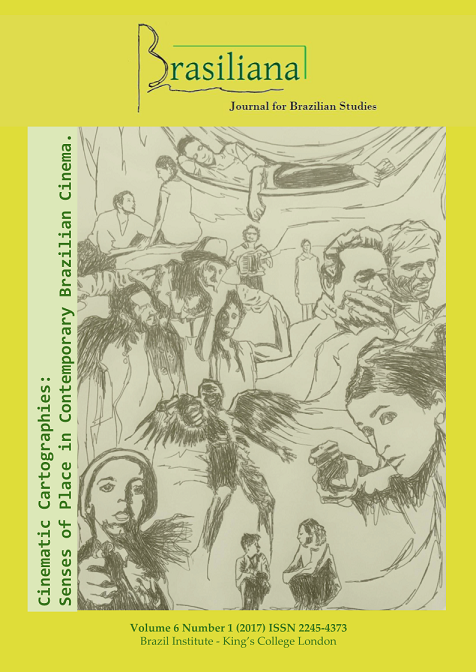Life, Death, and Fear in the Twenty-First Century Brazilian Graphic Novel
Conteúdo do artigo principal
Resumo
This essay identifies influential and prominent twenty-first century Brazilian graphic novels and associated sociocultural affects, such as racial inequality, gender disparities, and social dysfunctionality, as this Post-Boom literary genre expands into a global market. A specific selection of influential texts, key citations, provocative images, and disturbing themes is analyzed, revealing humanistic leitmotifs such as fear of death, violence, and disease, as well as fear of life, immigrant acculturation, futurism, and authoritarianism. The selection is limited to Brazilian graphic novels produced so far in the twenty-first century that have achieved a significant international readership: Daytripper (2014) by Fábio Moon and Gabriel Bá; Two Brothers (2015) by Moon, Bá and Milton Hatoum; Pixu (2009) by Moon, Bá, Becky Cloonan, and Vasilis Lolos; V.I.S.H.N.U (2012) by Eric Archer, Ronaldo Bressane, and Fabio Cobiaco; and Notas de um tempo silenciado (2015) by Robson Vilalba.
Detalhes do artigo
![]()
Articles published in Brasiliana are licensed under a Creative Commons Attribution-NonCommercial-NoDerivs 3.0 Unported License.
When publishing open access, the author signs an author publishing agreement in which they retain copyright and give Brasiliana the right to publish the article. Our Open Access publications are distributed under the terms of the Creative Commons Attribution 4.0 International License, which permits unrestricted use, distribution, and reproduction in any medium, provided the original work is properly cited.
Referências
Archer, Eric, Ronaldo Bressane, and Fabio Cobiaco. 2012. V.I.S.H.N.U. São Paulo: Quadrinhos na Cia. Baetens, Jan and Hugo Frey. 2015. The Graphic Novel: An Introduction. New York: Cambridge University Press. Cohn, Jesse. 2010. “Mise-en-Page: A Vocabulary for Page Layouts.” In Teaching the Graphic Novel, edited by Stephen E. Tabachnick, 44-57. New York: The Modern Language Association of America. Foster, David William. 2015. “Teaching Brazil and the Boom.” In Teaching the Latin American Boom, edited by Lucille Kerr and Alejandro Herrero-Olaizola, 137-46. New York: The Modern Language Association of America. —. 2016. “Preface.” In El Eternauta, Daytripper, and Beyond: Graphic Narrative in Argentina and Brazil, ix-xiii. Austin: University of Texas Press. Humphries, Sam. 2016. “Free the PIXU Four: A Chat with Bá, Cloonan, Lolos, and Moon.” In Comic Book Resources. Web. Accessed 18 April 2016. http:// robot6.comicbookresources.com/2009/03/free-the-pixu-four-a-chat-with-ba-cloonan-lolos-and-moon/. Knowlton, Charles S. 1992. “The Social and Spatial Mobility of the Syrian and Lebanese Community in São Paolo, Brazil.” In The Lebanese in the World: A Century of Emigration, edited by Albert Hourani and Nadim Shehadi, 285-311. London: The Centre for Lebanese Studies. Lesser, Jeff H. 1992. “From Pedlars to Proprietors: Lebanese, Syrian and Jewish Immigrants in Brazil.” In The Lebanese in the World: A Century of Emigration, edited by Albert Hourani and Nadim Shehadi, 393-410. London: The Centre for Lebanese Studies. Moon, Fábio and Gabriel Bá. 2014. Daytripper: The Deluxe Edition. New York: DC Comics. —, and Milton Hatoum. 2015. Two Brothers. Milwaukie, OR: Dark Horse Books. Moon, Fábio, Gabriel Bá, Becky Cloonan, and Vasilis Lolos. 2009. Pixu: The Mark of Evil. Milwaukie, OR: Darkhorse Books. Nichols, John G. 2010. “Violent Encounters: Graphic Novels and Film in the Classroom.” In Teaching the Graphic Novel, edited by Stephen E. Tabachnick, 230-37. New York: The Modern Language Association of America. Rabkin, Eric S. 2010. “Reading Time in Graphic Narrative.” In Teaching the Graphic Novel, edited by Stephen E. Tabachnick, 36-43. New York: The Modern Language Association of America. Schwartzman, Luisa Farah. 2007. “Does Money Whiten? Intergenerational Changes in Racial Classification in Brazil.” American Sociological Review 72 (6): 940–63. DOI: 10.1177/000312240707200605. Thompson, Craig. 2014. “Introduction.” In Daytripper: The Deluxe Edition, by Fábio Moon y Gabriel Bá, 7. New York: DC Comics. Truzzi, Oswaldo M. S. 1997. “The Right Place at the Right Time: Syrians and Lebanese in Brazil and the United States, a Comparative Approach.” Journal of the American Ethnic History 16 (2): 3-34. http://search.ebscohost.com/login.aspx?direct=true&db=hft&AN= 509643845. Vilalba, Robson. 2015. Notas de um tempo silenciado. Porto Alegre, Brasil: BesouroBox. Vollmar, Rob. 2012. “Review: Fábio Moon & Gabriel Bá. Daytripper. New York. Vertigo. 2011. ISBN 9781401229696.” World Literature Today 86 (2): 68-69. Yehya, Naief. 2001. El cuerpo transformado: cyborgs y nuestra descendencia tencológica en la realidad y en la ciencia ficción. Mexico: Paidós.

